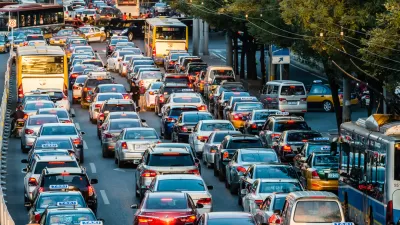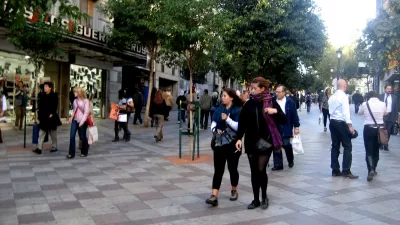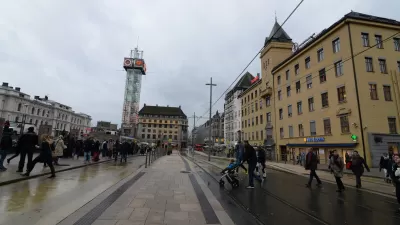Madrid, Spain is taking the next steps in restricting vehicular access to its urban core in the hopes of completely pedestrianizing central Madrid by 2020.
Karissa Rosenfield shares news out of Madrid, Spain: the city will close off an additional 190 hectares of its central core to traffic, bringing the total area of the city with restricted vehicular access to 352 hectacres.
Here's how Madrid's system works: "vehicles not belonging to residents within the city’s four most central barrios will be restricted to large avenues. If a vehicle enters the car-less zone, and does not have access to one of the 13 official parking lots, the owner will be automatically ticketed €90 ($115 U.S)." In Spanish, the restricted areas are called Áreas de Prioridad Residencial.
"The new legislation is part of a larger goal to completely pedestrianization central Madrid by 2020," according to Rosenfield, who shares the news as originally reported in Spanish byPolitica.
FULL STORY: Madrid to Eliminate Cars from City Center

Planetizen Federal Action Tracker
A weekly monitor of how Trump’s orders and actions are impacting planners and planning in America.

Congressman Proposes Bill to Rename DC Metro “Trump Train”
The Make Autorail Great Again Act would withhold federal funding to the system until the Washington Metropolitan Area Transit Authority (WMATA), rebrands as the Washington Metropolitan Authority for Greater Access (WMAGA).

The Simple Legislative Tool Transforming Vacant Downtowns
In California, Michigan and Georgia, an easy win is bringing dollars — and delight — back to city centers.

The States Losing Rural Delivery Rooms at an Alarming Pace
In some states, as few as 9% of rural hospitals still deliver babies. As a result, rising pre-term births, no adequate pre-term care and "harrowing" close calls are a growing reality.

The Small South Asian Republic Going all in on EVs
Thanks to one simple policy change less than five years ago, 65% of new cars in this Himalayan country are now electric.

DC Backpedals on Bike Lane Protection, Swaps Barriers for Paint
Citing aesthetic concerns, the city is removing the concrete barriers and flexposts that once separated Arizona Avenue cyclists from motor vehicles.
Urban Design for Planners 1: Software Tools
This six-course series explores essential urban design concepts using open source software and equips planners with the tools they need to participate fully in the urban design process.
Planning for Universal Design
Learn the tools for implementing Universal Design in planning regulations.
Smith Gee Studio
City of Charlotte
City of Camden Redevelopment Agency
City of Astoria
Transportation Research & Education Center (TREC) at Portland State University
US High Speed Rail Association
City of Camden Redevelopment Agency
Municipality of Princeton (NJ)





























